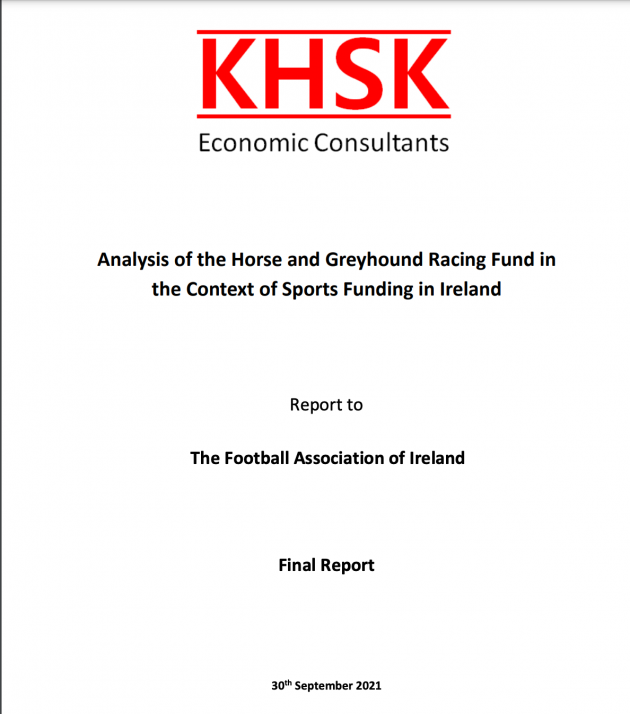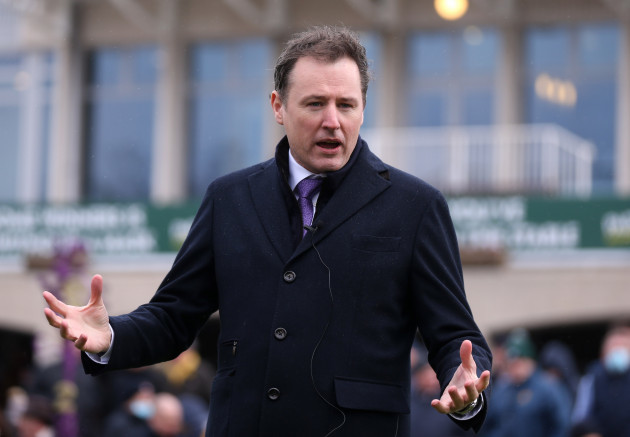ACROSS THE LAST week, the FAI have put a new spin on the old phrase of frightening the horses.
Let’s start by catching up.
**********
Last week, the Irish Independent published the details of a report titled, “Analysis of the Horse and Greyhound Fund in the context of sports funding in Ireland.”
It was written by KHSK Economic Consultants and was commissioned by the Football Association of Ireland. The date on the front cover reads 30 September 2021, so it has taken a while to enter the public domain.
After the Irish Independent published its details, The 42 obtained and reviewed a copy of the 77-page report.
The Horse and Greyhound Fund is the pot of money into which taxpayer money is paid to fund those two activities. It was set up in 2001, under a piece of legislation titled the Horse and Greyhound Act. This guaranteed income under a specific mechanism, linked to the nation’s levy on betting.
At the time, a tax of 2% was applied to every off-course bet made in Ireland. (It is paid by the bookmakers, rather than punters.) The 2001 Act ringfenced that money for the Horse and Greyhound Fund, regardless whether that bet was placed on sport or, indeed, on which sport it was placed. It was also stated in law that 80% of the money would be given to the Horse Racing industry and 20% to the Greyhound industry.
The law also insulated the Horse and Greyhound industries from any sharp drop in the returns from the betting tax by adding that the Fund would not drop below the total amount paid to the sports in the year 2000, when that total is adjusted for inflation. The Fund’s total was guaranteed to be the greater of those two figures, so in the years the betting tax yield was less than the figure for the year 2000, other taxpayer monies topped it up.
The FAI’s report ran the sums, and found the State has given almost €1.5 billion to the two activities since 2001. And given the betting tax was cut from 2% to 1% between 2006 and 2019 and only applied to online operators from 2015, there was a sizeable shortfall to make up in that time, so €494 million was paid in from a separate part of the State’s coffers to top up the funding.
The FAI’s argument is that not all bets in Ireland are placed on horse racing – it cites UK data in estimating that football makes up 20-30% of the betting market – so there should be a fairer divvying up of the returns from the betting tax, rather than the current scenario, in which the tax on a bet on a League of Ireland match goes to the Horse and Greyhound Fund.
It also questions whether the amount of funding that has gone to Horse and Greyhound Racing represents value for money, and calls for a full evaluation on the return on such large State investment in these two activities. The oft-cited defence for the investment in Horse and Greyhound Racing is that these are not sports, but industries.
(A 2009 government-commissioned report reviewing the Fund took as its starting point that both activities are industries – “the beneficiary of which is the economy as a whole” – rather than sports, which they delineate by saying “the beneficiaries of which are those who participate.”)
As regards Horse Racing, the industry itself states there is a €30 euro return for every €1 of State money invested. The basis for this is a report conducted by Deloitte and commissioned by Horse Racing Ireland (HRI), which reported that the activity is worth €1.84 billion in terms of expenditure and supported 28,900 jobs.
But the FAI’s report queried this jobs total, stating that many of these jobs are not directly linked to the Horse Racing industry, pointing out, for instance, that 6,000 of these jobs are those who work in betting shops, and another 7,700 are defined as having “secondary” employment. “The idea that all, or even any, of these people could be considered to have their jobs as a result of the [Horse and Greyhound] Fund is not valid”, argues the FAI’s report.
And one last significant question raised by the FAI’s report regards how the Horse Racing industry uses its State funding. In 2019, the HRI spent 64.5% of their funding on prize money, with the FAI’s report pointing out that the top 10 owners in both types of racing (flat and national hunt) won almost one-third of all the prize money in 2019. The HRI, for their part, argue that lucrative prize money is essential in preserving Irish racing’s place in a competitive landscape, and that this prize money trickles down to the rest of the industry.
But having raised these questions, the FAI’s report does not necessarily call for a cut in funding to the Horse and Greyhound industries. It makes three proposals. The first is to divvy up the Fund according to the proportion of bets placed upon each sport, which they estimate would mean the Horse and Greyhound Fund would get 60% of the Fund, football would get 20%, and other sports would share another 20%.
A second solution proposed is to raise the betting levy to 3%, which would be unpopular with smaller bookmakers in particular.
And a third is to raise the levy to 3% while guaranteeing the Horse and Greyhound Fund would not drop below their allocation for the year 2021, when it is adjusted for inflation.
**********
The day after the Irish Independent report was published online, Taoiseach Leo Varadkar fielded a question on it, replying to Labour’s Aodhán Ó Ríordáin in the Dáil by saying he didn’t like the approach. “I wouldn’t pit sport against the equestrian industry in Ireland.”
Later that week, on RTÉ Radio One’s Drivetime programme, Agriculture Minister Charlie McConalogue again criticised the FAI’s approach to the issue, describing it as “divisive.” (He spoke on the matter as his Department oversees the Fund, rather than the Department of Sport.)
The Department of Sport did issue a statement to RTÉ about the betting tax, however.
“We subsequently engaged with Department of Finance, who advised money raised from betting duty goes into general Exchequer funds rather than ring-fenced for particular purposes. As such, the question of how the betting duty proceeds are allocated is moot.”
This statement appeared to say the betting tax is not linked to the Fund, the word “moot” going a long way to suggest the FAI have just commissioned a lengthy report on an entirely false premise.
This was the trigger for an FAI pile-on, with which the football body is not unfamiliar over the years.
Alan Sweetman of the Racing Post wrote the FAI “may have accidentally put the ball in the back of their own net.”
Kevin Blake was more emphatic on the At the Races website, calling the FAI’s report “bizarre” and “ill-informed.”
“For KHSK Economic Consultants to have seemingly compiled an entire report based on such a glaring and false premise is quite remarkable”, he writes. “I hope the FAI have kept the receipt. With that premise shown to be ill-founded, the entire basis of the report is undermined.”
The same piece states that the Horse and Greyhound Racing Fund and the betting tax have not been linked since the Fund was transferred from the Department of Sport to the Department of Agriculture.
“Betting tax is returned to the exchequer. Separately, the government decides what is an appropriate level of investment to allocate to the Horse and Greyhound Fund on a discretionary basis. That is how it has worked since 2009.”
So given the entire premise of the FAI’s report was seemingly ended in 2009 the only question left to ask of the media, the HRI and the government is, why didn’t you tell us?
Why allow this false impression take hold for 14 years?
In the mean-time, a lot of significant people have been labouring under the seeming misapprehension that there is a link between the betting tax yield and the Horse and Greyhound Racing Fund.
In 2011, for instance, the then Minister for Agriculture, Simon Coveney.
My view is that the racing industry, whether it is greyhounds or horses, should be able to finance itself by having an appropriate level of betting tax in Ireland that applies both for online betting and in betting shops. And I think that the decision to effectively reduce what was once a 10% betting tax down to 1%, which has resulted in a significant decline in revenue coming from betting tax, was crazy.
And in the same year, Minister for Finance, Michael Noonan.
The lowering of the rate to 1%… has seen betting duty receipts fall from a high of €54 million in 2007 to an estimated €30 million this year. Historically, betting receipts have been tied to funding for Horse Racing through the Horse Racing and Greyhound fund. This fall in betting receipts has widened the gap between the level of Exchequer funding seen as desirable for the sector. Some €57 million has been provided in 2011, along with the receipts from the betting duty.
The government then commissioned a review of certain elements of the Horse Racing industry, conducted by Indecon.
It was published in 2012, and one of its recommendation was an increase in the betting tax by extending it to include online bookmakers. Still Minister for Agriculture, Simon Coveney accepted the recommendation and linked it to the funding of the sport.
But remember: we are told these two things have been totally separate since 2009.
And as recently as last November, Paul Murphy TD said the following in the Dáil during a debate on that year’s allocation to Horse and Greyhound Fund.
At least the Minister did not make the argument that Horse Racing Ireland, HRI, has made. It has stated it is not in receipt of any taxpayers’ money because all its money is raised from the betting tax.
The Minister of Agriculture did not immediately correct him.
But this mistake has persisted beyond just political circles.
This was written by the HRI Chairman Denis Brosnan, in the body’s annual report for 2010.
We welcome the Government’s commitment to betting duty as the basis of the Horse and Greyhound Racing Fund and to addressing the imposition of duty on online and off-shore betting on an equal basis with high street bookmakers.
And this from the HRI’s 2012 annual report, written by a new Chairman, Joe Keeling.
Horse Racing Ireland welcomes the Indecon Report and congratulates Minister Coveney, his Department and Indecon on the work done. It addresses the case for a betting levy regime to bring all betting providers into the tax system and provide an adequate and consistent level of funding for the horse racing industry.
The HRI spent part of that decade lobbying for an increase in the betting tax, which seems a curious use of time and energy if we are told there is no link between the two.
In 2017, HRI CEO Brian Kavanagh pre-empted the FAI in calling for an increase to the betting tax, suggesting a bump to 2.5% that would be paid by the customer rather than the bookmaker. The increased yield, he said, would eliminate the need for an Exchequer top-up to comply with the Horse and Greyhound Racing Act of 2001. “It would transfer the funding of horse racing in Ireland from all taxpayers to those that choose to have a bet”, he said.
And lastly, you’ll recall the 2017 Deloitte report mentioned above that has been the justification for the State investment into Horse Racing under the Fund?
Check out page 11 of the report.
The Irish Government supports the Irish Breeding and Racing industry through the Horse and Greyhound Fund. A 1% betting tax on all bets placed by Irish punters feeds into the Fund, which in 2016 paid €60m to HRI and is included in core industry expenditure.
The 2001 Horse and Greyhound Act is cited every year by the Minister for Agriculture when it comes to approving that year’s funding to both activities, and quoted as the justification for giving 80% of the money to the Horse Racing industry and 20% to the Greyhound industry.
Section 12 (4) of that Act created the explicit link between the Fund and the yield from the betting tax. We went looking for the amended legislation that severed that link in 2009. but we were unable to find it, so we emailed the Department of Finance and the Department of Sport on Monday, asking if they could point it out for us. The Department of Finance haven’t yet replied, the Department of Sport told us to ask the Department of Agriculture. We asked them on Tuesday, but they haven’t replied to us yet, either.
The issue was addressed by civil servant Brendan Gleeson at the Public Accounts Committee on Thursday. When asked that it appeared that the betting tax provided the cost of the State spend on the Horse and Greyhound Fund, he replied, “to a large extent, that’s true.
“There’s a betting tax there, it’s in the mid-90 millions, that’s correct, it covers or close to matches the cost of this – it’s not a strict process of hypothecation [ringfencing] but it’s part of the policy picture that supports the investment of these sectors.”
So it would seem that the betting tax money is no longer specifically ringfenced for the Fund but it often just happens to pay for it.
Given the betting tax is “part of the policy picture”, it is not credible to say the FAI’s entire argument is “moot”, as the government claimed last week.
The FAI’s report raised specific questions about the mechanism and the scale of funding to the Horse and Greyhound Fund, and, far from addressing them, the government’s response has raised even more.
It’s not just the FAI who deserve to hear the answers on this. It’s all of us.



